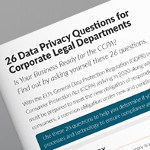Biglaw Firm Sued by Crypto Fund Manager for Alleged Malpractice
Faegre Baker Daniels is being sued for legal malpractice by a company that says the firm provided “erroneous” legal services relating to the launch and operation of a fund set up to acquire and manage crypto assets, according to a Bloomberg Law report.
Digital Capital Management’s complaint alleges that the law firm provided “inaccurate analysis and advice” to Digital Capital’s predecessor, Crypto Asset Management, LP, regarding how to register under the Investment Advisers Acts of 1940.
Crypto Asset Management alleges the firm advised the plaintiffs that “Crypto Assets are not securities” and to thus structure the fund’s business “accordingly.” The advice was “erroneous,” the complaint says, resulting in a censure and penalty from the SEC.
Read the Bloomberg Law article.






